ITB: East European hoteliers often still struggle with old structures
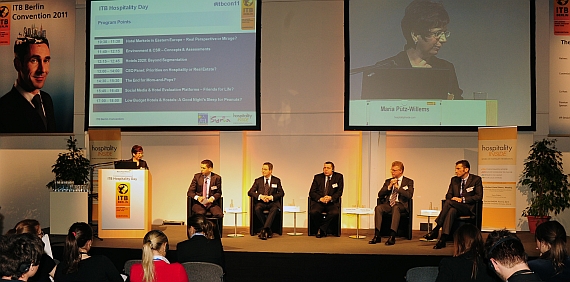 |
|
|
Maria Puetz-Willems (very left) welcomes the participants of the East Europe panel: (from left) moderator Martin Schaffer, Laurent Picheral, Kristian Sustar, Thomas Willms, and Friedrich W. Niemann. |
Berlin (April 29, 2011). Eastern Europe is so close and yet, is still a long way off: The hotel industry in Romania, Russia, Croatia and partially also Poland is struggling not only with a sluggish economic recovery after the financial crisis, but also with the often still decrepit tourist structures in the background. However, slow movement is returning to some master plans that were already put into play before the financial crisis. A discussion regarding "Hotel Markets in Eastern Europe - Real Perspective or a mirage?" illuminated the current challenges. With this report, hospitalityInside.com concludes the reporting on the ITB hotel conference 2011.
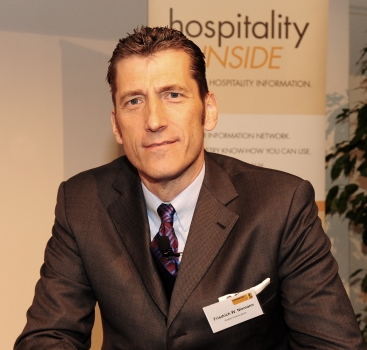 |
|
| Friedrich W. Niemann. |
Over the course of five years, Friedrich W. Niemann was General Manager at the Hilton Bucharest in addition to being Chairperson of the Tourism Committee. But even after his return to Germany half a year later, he is still enthusiastic about Romania as a travel country. However: "Romania has not yet recovered from the crisis; the hotel industry still suffers," he said in Berlin.
Also past are the golden times in Russia where Moscow five-star hotels could still set prices at more than 1,000 dollars per overnight stay through to 2008. Now with the new, quickly growing steel and industry locations measures to open hotels are also increasing in the country - but rather with mid-scale hotels, says Thomas Willms, Vice President & Regional Director East & Central Europe, Starwood Hotels & Resorts. A great deficiency remains with the poor infrastructure within the country.
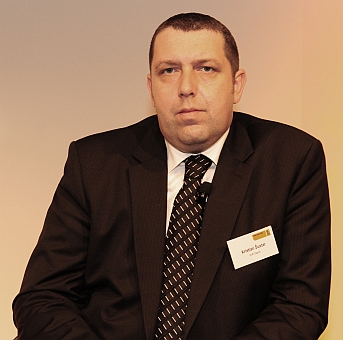 |
|
| Kristian Sustar. |
In the cities of Croatia and throughout the country, the fundamental problems are similar - however for hotels, there would still be many good opportunities, said Kristian Sustar, Executive Director of the hotel group, HUP Zagreb and at the same time, President of the Croatian Hotel Association. In general, there is no large gap in hotels between the coast and inland but there are not enough high-quality brand hotels.
The only country that remained almost untouched in tourism by the world financial crisis is Poland (Poland was also a partner country of this year''s ITB). The locals make up the majority of the tourists; the Poles themselves are regarded as keen and very much engaged - likewise in the hotel industry as reported by Laurent Picheral, CEO of the largest chain in the country - Orbis SA., an Accor subsidiary.
Success factor - staff
Thus Orbis also supports, for example, Polish vocational and hotel schools and cooperates with the ministries. "However, there is still not enough momentum, more activities and above all, the young people need more practical training in the hotel industry," said Picheral. The large international chains like Starwood and Hilton previously have opened and operated hotels in "emerging markets" with expats and today, have intensified the inclusion of locals from the outset. Moreover, the language remains a challenge: Only those who are competent in Russian can also be moved into other hotels in the east. A suitable exchange under the hotels has begun. As a rule, the Croatian staffs speak three or four languages; in the meantime however, hoteliers suffer from the high fluctuation that is caused by the relatively short season there.
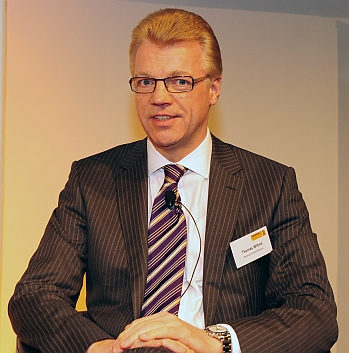 |
|
| Thomas Willms. |
The country representatives and hotel representatives were united amongst themselves with a single point: Today, no staff member gives notice because of 50 Euros more salary. They are usually very proud of their company when it has been established in the market. "The further to the east one goes, the higher the loyalty is praised," comments Thomas Willms.
Old thought patterns delay development
In particular, Niemann criticised Romania for its poor measures in education, the too strong emphasis on theory and above all, the "historically" moulded lecturers who have no knowledge of current hotel processes and hotel standards. Therefore, the luxury hotel industry has also had difficulty finding staff with an understanding of western service.
With this, Romania is still fighting to find itself as Niemann continues: "For three years, there has been a tourism minister and an action plan through to 2025, but the strategic beginning is absent." Moreover, there would be no dialogue with the hotel industry. "Romania is a great country with vast tourist potential, but with a bad image," he summarises.
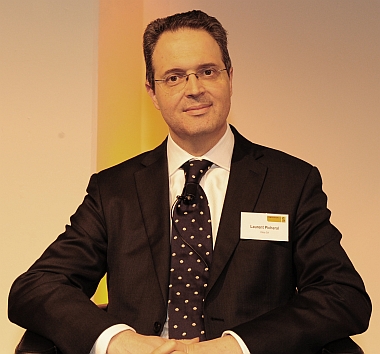 |
|
| Laurent Picheral. |
To stimulate tourism in and beyond the core cities of Moscow and St. Petersburg in Russia, it requires a simplistic and less expensive visa policy. According to Thomas Willms, the current regulations should be waived under certain circumstances for the World Championship in Sotchi, but the general problem currently remains.
No steady development of the segments
In Poland, the focus at the moment rests too strongly on mega-events such as the coming European Football Championship. Laurent Picheral: "Today, 80% of the business comes from the MICE segment. If one wants to stimulate the leisure market with its current 20%, one must create new attractions." Germany is regarded as a primary source market for Poland; they could be motivated even more strongly to travel to the seaside resorts or to the Masuria lake region due to the geographic proximity and thanks to the new highways and good flight connections.
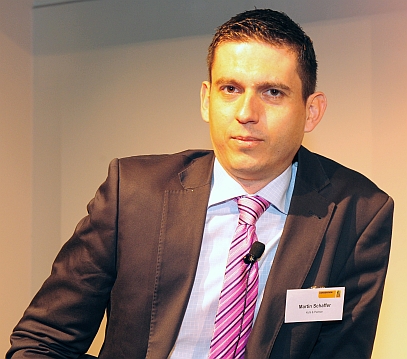 |
|
| Martin Schaffer. |
Thanks to professional TV advertisements, Western Europeans already perceive Croatia as a top-notch travel country, but development there is also delayed by tourism professionals with antiquated thinking. "But in this summer, however, we still want to activate a new master plan," says Kristian Sustar. A handicap for Croatia during the last years has been the legally unclear questions of ownership that have prevented foreigners from buying, e.g. holiday apartments for themselves in Croatia. Analogously, many investors renounced the development of Mixed Use projects, for example. However, the basic conditions have improved over the past two years and according to Sustar, the Croatian coast is to be protected and development permitted only in niches.
Private and boutique hotels as a chain competition
On the one hand, the Eastern European countries lack in a broad (only just slowly emerging) offering of quality hotels, on the other hand, families in Bucharest, for example, are developing many small boutique hotels at an excellent level. However, because of poor marketing, many foreigners do not find these properties. In Poland, about 96% of the hotel rooms are still in private hands and move in the 3 to 5-star levels. "Nevertheless, there are already 2-star hotels", says Picheral and confesses that Accor considers whether the franchise concepts are still the suitable expansion vehicle for Poland due to these new, equally professionally outfitted hotels. Low budget hotels after the western example are virtually non-existent there.
Now in gigantic Russia, investors have laid their attention on the secondary locations and the development of mid-scale hotels. But also, there is the matter of offering "Pure Hotellerie": the best restaurant in the city, offers for a Sunday brunch, a little wellness … Thomas Willms on the basic feeling in the east of Europe: "There is still a little Gold Rush feeling among us!" / Maria Puetz-Willems
Continuative Links:
To print this article you have to be registered and logged in for newsletter, visitor or subscription.





